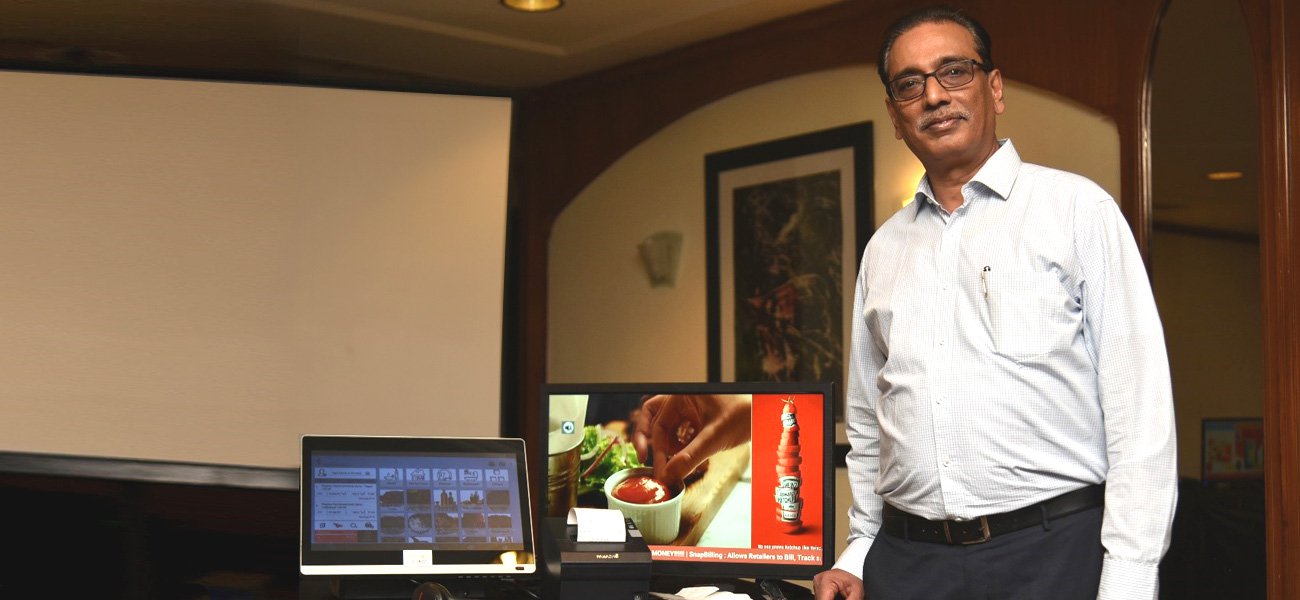Anil Kumar rummages through rolls of sachets of shampoos, instant coffee powder, condiments hanging from a clothesline in his tiny, nondescript store’s facade. His customer looks unsure as he can’t see the shampoo brand he wants to buy but Kumar assures him he has it stashed somewhere in his shop crammed with groceries.

Kumar’s family owns Sri Lakshmi Venkateshwara Traders, a convenience store (called kirana stores in local parlance) in the RS Palya neighbourhood in Bengaluru. Operating the store in shifts along with his mother and brother, Kumar knows that the store doesn’t show up on any maps but it has been doing brisk business with a regular clientele. But now, not only does the Kumar family compete with other kirana stores that dot the narrow lane, but also with bigger retail stores in the vicinity that have dozens of aisles where their customers are always spoilt for choice.
“Many customers have moved to shopping at larger stores and supermarkets where they can browse all the products that they have. Even I have most of those products but can’t display everything because of lack of space,” he complains in Kannada, his native language.
Thankfully for Kumar, while he searches for the product, his customer is distracted by an LED screen advertising a new soap brand with an inaugural discount on it. He buys that soap in addition to his initial order, and leaves the store satisfied.
About three miles away from the Kumar’s, in the city’s Bayyappanahalli locality, N Krishnamurthy had a different problem. Owner of a relatively larger kirana store, he struggled to calculate his earnings and file returns for the newly introduced Goods and Services Tax (GST) every month. To make matters worse, the lack of digital payments at the time of demonetization and always-on discounts the larger retailers could offer, his regular customers were walking away.
After all, there’s only so much a notepad and calculator can do.
Kirana stores at the time of e-commerce
Even as online and organized retail is picking up steam in India, there are still nine million kirana stores in the country that form the so-called “unorganized” retail and their scale of operations is mind numbing. These kirana stores cater to the needs of 90% of consumers or 1.2 billion people. According to industry estimates, they see 750 million transactions every day and account for $120 billion in gross merchandise value annually. These kirana stores are served by more than 1,000 FMCG companies riding on more than 250,000 distributors.
However, most of these stores have no digital connectivity, which means that the store owners don’t have relevant data-driven insights to serve their customers better and FMCG brands have no store-level data of how consumers are shopping in these stores.
While digitization would seem to be the obvious solution for most kirana store owners, it was easier said than done. Most PoS terminal sellers offer an accounting and inventory solution, and, look at making revenues from store-owners. They are expensive too, costing as much as $1,500, which is a big deterrent for kirana store owners that work on razor-thin margins and are usually run by the owner.
Kirana stores become virtual supermarkets
Prem Kumar, a corporate CEO-turned-serial-entrepreneur, decided to do something about it. What if he could digitize these kiranastore owners, increase their sales, and also offer them an additional revenue stream? In 2013, that germ of an idea translated into Snapbizz, a Bengaluru-based mobile technology platform that is using the power of cloud and analytics to empower the fragmented kirana store owners.
“We’re moving these retailers from calculators to the cloud,” exclaims Snapbizz’s Kumar.
The company offers a Windows 10 based tablet, along with a scanner, LED display screen and printer which acts as the PoS terminal. Considering these kirana stores don’t have any internet connectivity, a portable Wi-Fi hotspot connects the terminal to the Microsoft Azure cloud. The solution enables a retailer to carry out everyday store operations like billing, inventory management, CRM, supply chain management alongside driving contextual customer engagements.
It also allows a rich layer of analytics, rendered through highly interactive dashboards on PowerBI that provides actionable insights for FMCG brands, market research organizations and fintech firms. Snapbizz also leverages Cosmos DB that helps in the storage of bills and enables consumer analytics.
Additionally, SnapBizz retailers get customized apps for their stores to connect with their loyal consumers and enable them to order groceries from the comfort of their home. On the distributor side, the system connects retailers directly with wholesalers and suppliers that improves efficiency of their overall procurement model.
“Our focus is to bring enterprise-grade technology to the traditional retailers alongside building skillsets in their workforce. With the Windows 10 operating system for the client-side solution, backed by Microsoft Azure at the back-end, we’re not only solving for robust levels of agility and reliability, but also a highly secured ecosystem, given there’s a lot of data transmitted every second, with every transaction at the store,” Snapbizz’s Kumar explains.
A success store-y
While the backend technology had to be enterprise grade, the user interface had to be extremely simple to understand–after all this would probably be the first-time majority of kirana store owners would interact with a touchscreen tablet.
“It took me just three days to get comfortable with the SnapbizzPoS. What’s more, even my mother and brother were able to get a hang of it quickly,” says Kumar, the kiranastore owner and one of Snapbizz’s early users.
Not only did they make the daily operations simple but also ensured that the owners could file their GST returns effortlessly.
“I no longer have to worry about tax calculations. It was a cause for concern before because GST is something we couldn’t grasp as easily. This solution handles all of those complexities and has really improved the way we work,” adds Krishnamurthy, the other kirana store owner who is also an early-adopter of Snapbizz.
What really differentiates Snapbizz from other PoS vendors is Snap Vision–an LED display that can show promotions and new products from FMCG companies. Armed with store-level insights, FMCG brands can pinpoint consumers in the right stores by offering targeted promotional discounts and showcase their products on these Snap Vision LED displays. The display not only drives additional sales for the kirana store owners but also adds a monthly revenue stream via product placements.
“Displaying store offers and product launches on Snap Vision has increased customer engagement. It alone has improved my sales by up to 10%. Customers were curious about the discounts we offered and started purchasing these additional products,” adds Kumar, the owner of Sri Lakshmi Venkateshwara Traders.
Snapbizz is currently present in over 3,000 kirana stores and works with 25 FMCG brands. Some kirana store owners have seen their profits increase by up to 25% and productivity gains of up to 30%, as the terminals take care of a lot of things like inventory management and book-keeping that were earlier done manually. Meanwhile, FMCG brands have witnessed user trial rates go from 3% to 48% in certain scenarios.
After tasting success, Snapbizz co-founder Kumar has his eyes set on reaching 20,000 kirana store owners in the next two years and half-a-million in five years. The company is receiving as many as 500 enquiries every month from retailers across the country. That’s not all, the company is also seeing demand in similar markets like the Philippines, Indonesia, Vietnam, and Africa.
The next time you visit your friendly neighborhood kirana store and see a touchscreen POS machine and LED display offering you discounts, don’t be surprised. Kirana stores are not the same anymore—you’re witnessing the future of traditional retail in India.






